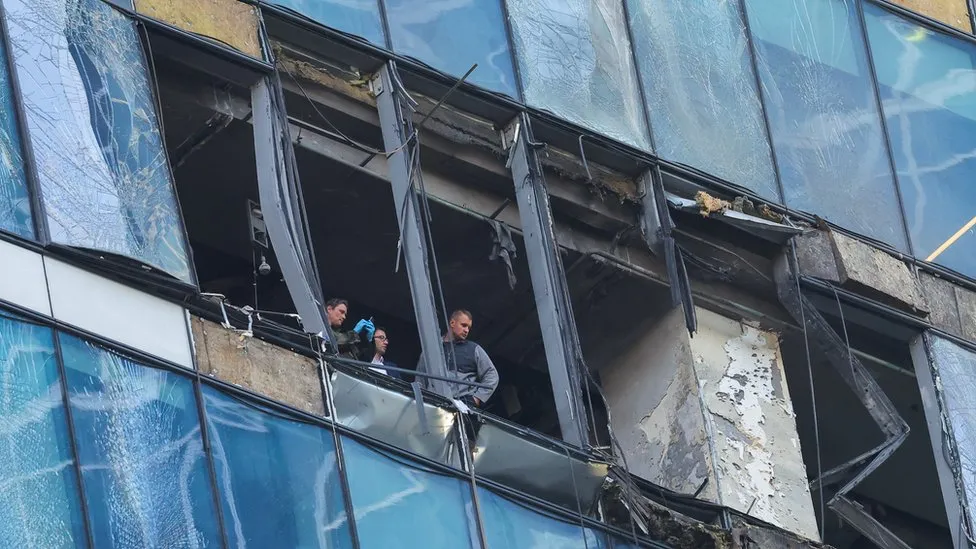Moscow drone attacks: Residents shrug off skyscraper strikes
Towering over Moscow's golden church domes and Stalin-era skyscrapers is the uber-modern business district of Moskva-Citi.

Located 7.6km (4.7m) from Red Square and the Kremlin, Moscow's answer to London's Canary Wharf or New York's Financial District has been hastily built over the last 20 years.
It is now home to the highest number of skyscrapers in Europe.
The muddy front lines of the war in Ukraine must feel very far away.
Yet one of Moskva-Citi's glitzy skyscrapers has been hit by drones twice in the space of a few days.
On 30 and 31 July, two separate drones crashed into the building's glass facade, shattering parts of it. Reports said that the section that was hit houses the ministry of economic development and that its employees have now been told to work from home.
The scale of devastation is a fraction of that endured by Ukraine since Russian launched its full-scale invasion last year. But witness reports from the scene in Moscow sound strikingly similar to the every day accounts Ukrainians have been sharing since the start of the war.
One resident, Arkady Metler, was defiant: "There wasn't much panic, just everyone went outside. There is no fear... All we can do now is stick together and everything will be fine," he told AFP.
But others were considerably more nervous.
"During the night I was woken up by a bang, there was an explosion," Anastasia Berseneva told the BBC. "I looked out of the window and I saw that cars were stopping and that's how I realised that it [a drone attack] had happened."
"I don't know what I'm going to do, but I think I'm going to move from here," Ms Berseneva said.
She seemed particularly unnerved by the fact that Tuesday's drone attack hit the same spot another drone targeted last Saturday: "After the first [drone attack], everyone said it wouldn't hit the same place twice... My tower guard and I were a bit shocked."
But Moscow is a big city, and few residents will even have seen or heard the drones. While many might be nervous about such attacks becoming more frequent, they might also feel rather unconcerned by them.
"In terms of the building construction, (the drone attack) was like a mosquito bite for a human. Because the building is well constructed, those devices can cause only cosmetic harm, and the structure of a building won't be damaged," Moscow resident Alexander Gusev told Reuters.
Masha - not her real name - told the BBC's Ukrainecast: "We have felt nervous for the last two years but this drone attack is rather ordinary for us because we are used to bad news... Unfortunately, I think this is our new reality."
She said that people "don't feel more scared. We all understand that in future there will be more attacks."
On Tuesday, Ukrainian presidential advisor Mikhailo Podolyak appeared to foresee a similar scenario: "Moscow is rapidly getting used to a full-fledged war... More unidentified drones, more collapse, more civil conflicts, more war," he wrote on Twitter.
Ukraine has never publicly claimed responsibility for these attacks.
However, experts say that Ukraine - whose Western allies would not allow it to strike Russian territory using Western-made weapons for fear of an escalation - has likely been employing Ukrainian-made drones in their attacks on Moscow.
These drones might not be able to cause much damage beyond small explosions, but they can seriously fray the nerves of Muscovites who might prefer to keep the war out of sight and out of mind.
Although there is no clear evidence on where these drones are launched from, they "spell trouble for the Russian authorities," Pavel Aksenov of the BBC's Russian service says. "If launched from behind the front line, it implies the weakness of Russian air defences. If the drones were launched within Russian territory, it suggests that the security services lack control over their own country."
"Launching such a large device is not an easy task and shouldn't have gone unnoticed."
Meanwhile, some are cashing in on the sense of resignation that more attacks are inevitable. One insurance company now provides customers with home insurance policies that include damage done by "falling flying objects or their debris" such as drones.
"We decided to support our clients... against the current risks of the modern world," said a director at Alfa Insurance.
-bbc







